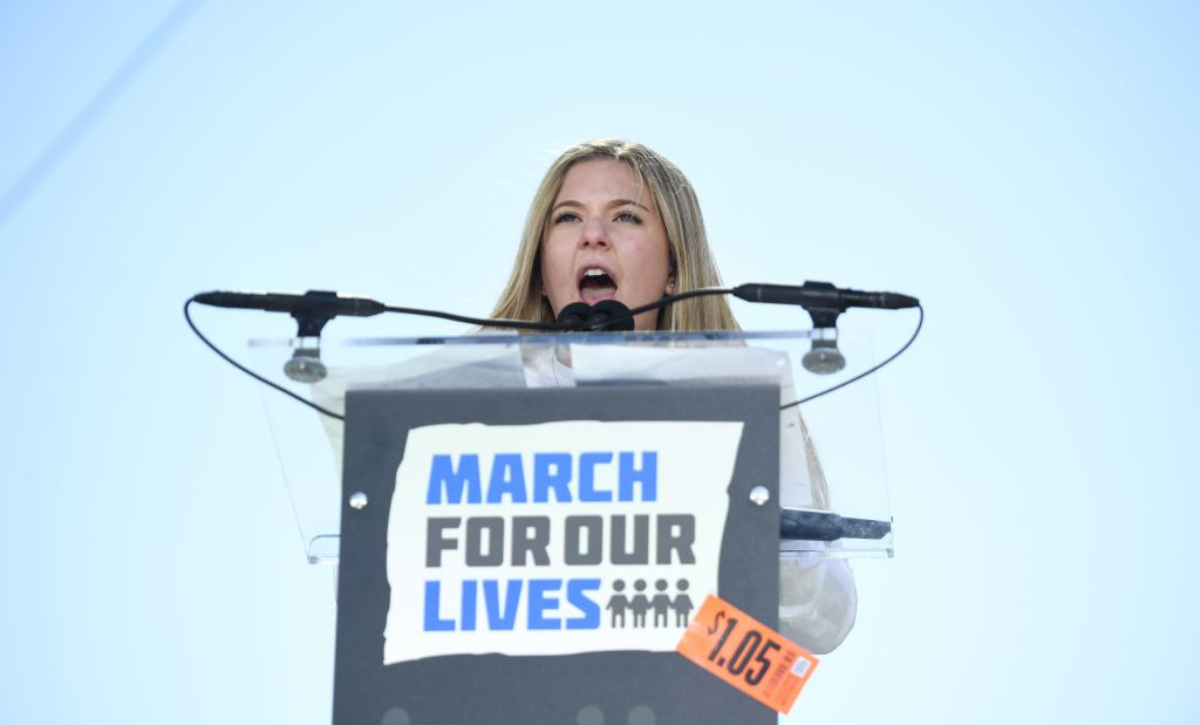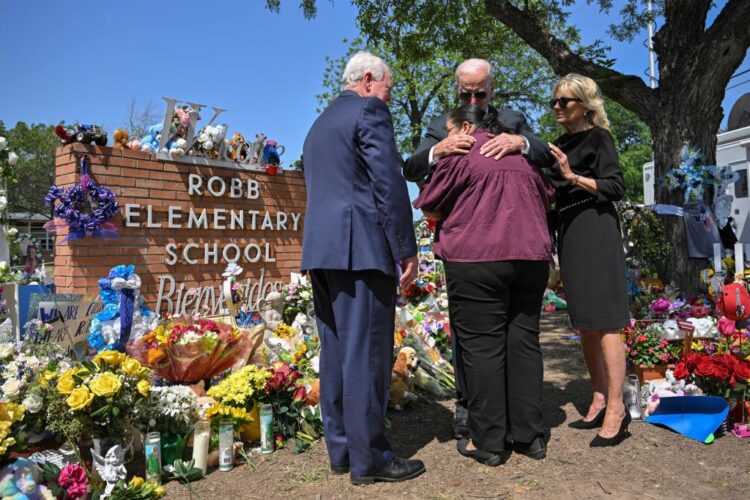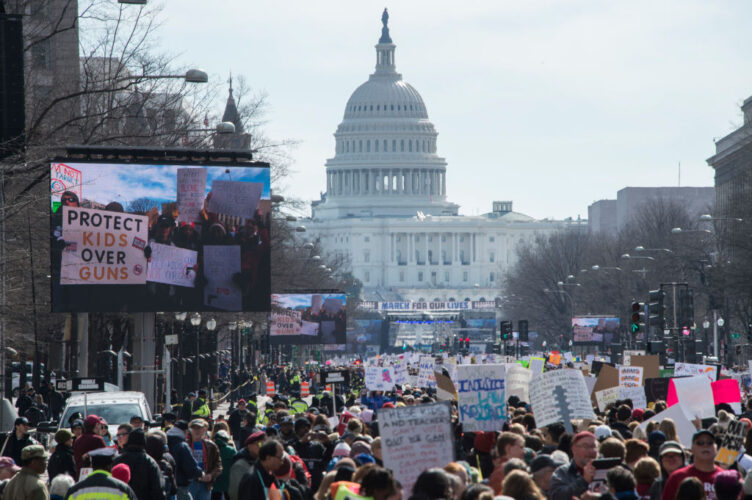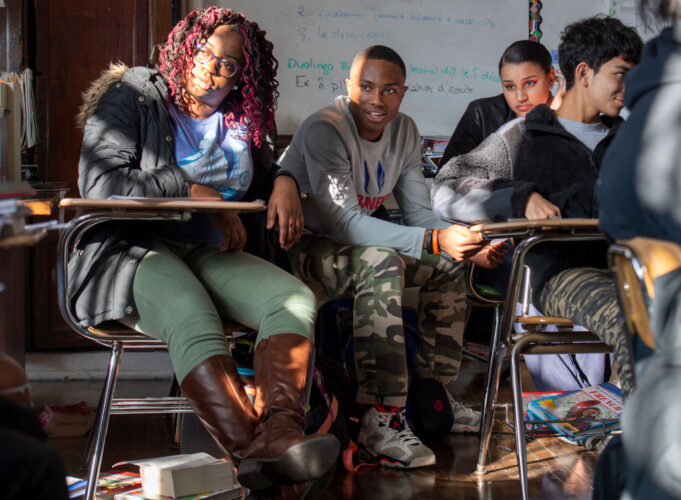After Uvalde Shooting, Parkland Survivors Head Up Huge Gun Safety Rally — Again
Their chants of “never again” did not hold, but March For Our Lives activists still fighting to end mass shootings with a new DC rally Saturday

Get stories like this delivered straight to your inbox. Sign up for The 74 Newsletter
Just a month after a gunman killed 17 people at her high school in Florida, Jaclyn Corin stepped up to a podium in Washington, D.C., and spat out a sharp-tongued rebuke of the lawmakers she accused of failing to keep communities safe from gun violence.
“Our elected officials have seen American after American drop from a bullet,” said Corin, a survivor of the 2018 mass school shooting in Parkland, then the Marjory Stoneman Douglas High School junior class president. As a co-founder of March For Our Lives, her advocacy in 2018 galvanized a countrywide movement that brought hundreds of thousands of demonstrators to the National Mall to demand new firearms laws. “And instead of waking up to protect us, they have been hitting the snooze button. But we’re here to shake them awake.”
Yet four years after youth activists chanted “never again,” some might argue that America is still sleepwalking through wave after wave of gun violence. The latest mass shootings in Buffalo, New York, and Uvalde, Texas, are once again wreaking havoc on American communities and student advocates are once again preparing to hit the streets to force an end to the carnage.
On Saturday, Corin and other advocates with the youth-led March For Our Lives, including David Hogg and X Gonzalez, will return to Washington for a second rally to press for new firearm restrictions and a slew of policy changes they believe could thwart a gun violence rate that’s unrivaled by other developed nations.
Their insistence that children should never again be allowed to die by gunfire in school was belied — again — by the reality of Robb Elementary School in Uvalde, where 19 children and two educators were shot and killed May 24.
“Four years ago we said ‘never again,’ there’s never going to be another Parkland, and unfortunately that has not reigned true,” Corin told The 74. Since then, Corin has graduated high school and is now a rising senior at Harvard University, where she studies government and education. During those years, mass shootings have continued to grow more common, with the Uvalde assault becoming the second-deadliest school shooting in U.S. history. “A large reason for that is because barely anything has been done on a national level.”
Along with a midday rally at the Washington Monument, organizers have planned hundreds of protests in communities nationwide, all in a matter of weeks. Ahead of the event, March For Our Lives advocates are meeting with lawmakers in Washington this week to promote their agenda.
They hope for a different outcome this time, but acknowledge the obstacles that have blocked change in the past remain as challenging as ever. In a fiery prime-time speech last week, President Joe Biden questioned “how much more carnage are we willing to accept?” before calling on Congress to ban assault weapons — or to at least raise the age from 18 to 21 for those looking to buy one. He also pushed for a ban on high-capacity magazines, strengthening background checks and adopting a federal “red flag” law that would allow courts to temporarily remove weapons from people deemed an imminent threat to themselves or others. At the same time, he lamented that “a majority of Senate Republicans don’t want any of these proposals even to be debated.”
After the Parkland shooting, the Trump administration imposed a ban on bumpstocks, a device that uses the recoil of a semiautomatic gun to mimic an automatic rifle. Yet even though then-President Donald Trump embraced an effort to raise the age on rifle sales, efforts fell flat.
Earlier this week, Democrats expressed optimism in negotiations with Republicans over gun proposals after the Uvalde shooting while pointing out that compromises would be crucial to progress. Instead of major firearm restrictions, a bipartisan deal could encourage states to adopt red flag laws and new funding for campus security upgrades — a reaction that for years has followed virtually every mass school shooting. Sen. John Cornyn, a Republican from Texas, has said “it will be embarrassing” if Democrats and Republicans in the Senate fail to reach a legislative response to Uvalde.
Meanwhile, a ruling this month from the U.S. Supreme Court is expected to strike down a decades-old New York law that puts sharp limits on who can carry guns in public.
For Corin, having a Democrat in the White House isn’t necessarily an encouraging sign. Biden has been president for a year and a half, yet “we haven’t seen anything done,” she said. While Biden has sought to pass the issue onto Congress, Corin said her group has called on the president to appoint a gun violence prevention director, to create a task force focused on the issue and to “declare gun violence a national emergency — but that hasn’t happened either.”
“No one is exempt from doing work on this issue,” Corin said. “I know the executive office doesn’t have all of the power, but ultimately everyone has a role to play.”

Corin is very aware that the post-Parkland focus on gun violence had a larger impact at the state level, where local lawmakers enacted a slew of new firearm restrictions. In her native Florida, for example, lawmakers passed a red flag law, raised the age to buy rifles from 18 to 21, created a three-day waiting period on gun purchases and authorized certain educators to be armed at school. In New York, lawmakers responded swiftly to the Buffalo shooting and approved a new law on Monday to strengthen gun control measures, including a red flag law that was implemented after Parkland.
“I can only hope that the same sadness and fury that the country is feeling now, as we all did back in 2018, will fuel the continuation of these changes on the state level and ultimately — hopefully — on a national level,” said Corin, who once tutored the former Marjory Stoneman student who pleaded guilty in October to opening fire on the school.

In its policy platform, March For Our Lives blames American gun violence on a culture of “gun glorification,” political apathy, poverty and “armed supremacy” in which the threat of guns are used to “reinforce power structures, hierarchies, and status.” And while they recognize a national mental health crisis exists, they oppose “scapegoating” those with mental illnesses as being a threat to others when they’re actually more likely than those without such disorders to become gun violence victims.
Solutions, according to the group, include a ban on assault rifles and high-capacity magazines and a national firearm buy-back program that could reduce the number of firearms in circulation by some 30 percent. There are an estimated 393 million guns in circulation across the U.S. — that’s more guns than people.
But the group’s platform extends far beyond firearm policies to prevent violence and encompasses a slew of policies generally associated with Democrats. Those include ending the “war on drugs,” combating the “school-to-prison pipeline,” and reducing the scope of policing.

For RuQuan Brown, a D.C. native whose stepfather was killed in a 2018 shooting, the conversation, he said, needs to “focus more on love than legislation.” RuQuan, who is Black, said that urban gun violence has long failed to garner the same urgency as mass shootings like the ones that played out in Parkland and Uvalde despite accounting for a small fraction of American gun deaths.
Through his work with March For Our Lives, Brown said he’s been able to help ensure that the experiences of all gun violence victims are reflected in reform efforts.
“I’ve been able to work with March to make sure that when we talk about March For Our Lives, that all peoples’ lives are included in that,” said Brown, who also attends Harvard. For him, uplifting disenfranchised communities will be the key to gun violence prevention. “This country and its ancestors are extremely comfortable with the deaths of Black and brown people, it’s almost a part of the fabric of this country. America wouldn’t be what it is without the deaths of Black and brown people, the genocide, the rape and the forced labor.”
He said it’s critical that lawmakers develop compassion for, and a commitment to help, society’s most marginalized people. If they were “committed to furthering the well-being of all people,” he said, “We wouldn’t even be having this conversation about gun violence.”
With the midterm elections approaching, Corin predicted the recent mass shootings, including at the Uvalde elementary school and a Buffalo supermarket, could once again make gun violence a top issue on the campaign trail. It’s more important than ever, she said, for candidates to let people know on which side of the issue they stand.
“If people aren’t clear on their stances and if they don’t act with courage, they’re going to be voted out,” Corin said. “And you know what, we’re going to vote in someone that doesn’t believe that children should be shot in their seats in school.”
Get stories like these delivered straight to your inbox. Sign up for The 74 Newsletter

;)
